Searching for Jesus in contemporary ‘Christ-mas’

Visitors take pictures at a Christmas display at Meralco Liwanag Park in Pasig City, Philippines on Wednesday Dec. 11, 2024. (AP Photo/Aaron Favila)
Simbang Gabi. Puto Bumbong. Family reunions. Giant parols. Lights and sounds of festivities. The spirit of Christ fills the air during the final two weeks of December.
And BTW, the Philippines is known for having the longest Christmas celebration on earth. Today, Simbang Gabi is in every space on the globe where the Overseas Filipinos gather.
I am missing the old Christmas, when it used to be the most wonderful time of the year when the biggest population of the planet celebrated the season with faith and less commercialized delights. Now, my being a senior citizen is revealed.
It used to be a season characterized by other-centeredness, a desire to share Christmas blessings with friends and to reconcile with enemies. Funny, I wore that red-and-green sweater and received more hugs and kisses from perfect strangers.
Even rebels anticipated this time of the year. A ceasefire between the military and the New People’s Army was mutually declared due to the fact that Christmas was a universal celebration of the birthday of the Prince of Peace.
Was it Isaiah who prophesied in the 8th century BC: “For a child will be born to us, a son will be given to us […] and His name will be called Wonderful Counselor, Mighty God, Eternal Father, Prince of Peace?”
And such prophecy was fulfilled when the historical Jesus was born of a woman, the “Word made flesh and dwelt among us” (John 1:14). O, I relish the lyrics, “O Holy Night… It is the night of our dear Savior’s birth,” composed by Adolphe Adam in 1847 and sung by Josh Groban or Andrea Bocelli, a song that melts even the hardened and indifferent soul.
The town of my youth is Balic-Balic, Sampaloc, Manila, where as a child, I used to listen to boys and girls in their traditional caroling from house to house, rendering everyone’s favorite “Joy to the World,” composed by the British composer Isaac Watts in 1719.
Brothers and sisters decorated the Christmas tree as they watched their grandmas, moms and daughters cook the old recipes. O, the sweetest smiles of our kids when they opened the gifts – how can we forget them?
This December, I managed to sit down one day and wondered what it means celebrating the birthday of the Prince of Peace for many people in this most uncertain period in history. Well, foremost in my mind are the fire victims of Isla Puting Bato in Tondo and typhoon victims in the Visayas and Luzon who are still staying under the roof of the evacuation centers.
How do the tens of millions of those in the existential peripheries, nasa laylayan ng lipunan, the non-practicing Catholics, the disaffiliated, those busy with survival, cannot attend the Mass, and therefore miss the narrative of the most beautiful story ever told: Although Jesus is the omnipotent God who can scan the heights of the heavens and the width of the universe, he assumed our weak human nature?
For many Christians, Christmas is what they see and hear commercially. And where is Baby Jesus, supposedly the main birthday celebrant? And what about our gifts to the birthday celebrant? Say, going to confession this season?
What about the billion people in the most difficult places? Will Christmas have a meaning when they live day after day amid sufferings, face to face with so much violence and abuses against women, children, and the vulnerable—physical, emotional, spiritual, verbal, sexual, and psychological?
How do the most deprived members of humankind who endure widespread hunger, deprivations, and tragedies sing Christmas carols or light the Christmas tree? When manmade disasters and the unending series of pathos are inflicted by humans against fellow humans, in some cases in the name and language of religion?
How do people celebrate Christmas amid wars when Bethlehem itself, where our Lord Jesus was “born of a woman” (Galatians 4:4), is facing a very quiet Christmas as the blaring sounds of alarm and the ceaseless roars of Israel’s war go on?
So, how do we implement in our little ways Pope Francis’ dynamic, synodal and missionary discipleship? How do we become a bright meteor, though small, that can light up the darkest night?
Or, in other words, how do we who claim to have Jesus in our hearts, get out of comfort zones, capture the hearts and minds of others, and help them search for Jesus and encounter Him this Christmas?
José Mario Bautista Maximiano is the lead convenor of the Love Our Pope Movement (LOPM) and author of the book “Church Reforms 3: The Synodal Legacy of Pope Francis” (Claretian, 2025). “Church Reforms 1” and “Church Reforms 2” are available on Lazada and Shopee. Email: jomaximiano@gmail.com

